Dr. Paul T. P. Wong’s autobiography, A Lifelong Search for Meaning: Lessons on Virtue, Grit, and Faith, is published in weekly installments. Stay updated here.
Writing my autobiography has been a long journey–it started in 2012 and completed in 2019. It was also a very painful process, confronting and reliving many of the darkest days of my life. Yet, I am most grateful that it has transformed me and given me so many profound insights about the positive power of suffering. It has reinforced my belief that one can only achieve sustainable happiness and success through overcoming suffering—the main tenet of second wave positive psychology (PP 2.0).
I would not have written my memoir without the kind invitation several years ago from Mr. Chou Chin-Hua, President of the Chou Ta-Kuan Cultural and Educational Foundation. It has taken much longer than anticipated. The main cause of the delay was 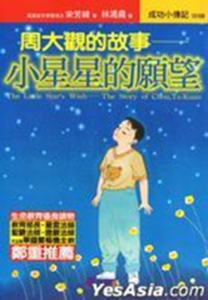 not knowing how to honestly tell my life story without offending people, but I still failed miserably.
not knowing how to honestly tell my life story without offending people, but I still failed miserably.
I now accept the fact that, even with the best intentions, it is inevitable that some people will be offended when you dare to tell the truth. Some of my family members were angry with me, even when I sincerely tried to depict them in the best light possible. Many colleagues were also mad at me, because they happened to be part of the conditions and causes of my misfortunes.
My consolation is that far more people have found inspiration and help from reading my struggles and triumphs. My wish is that I too can bring meaning, hope, and love to suffering people as Chou Ta-Kuan has.
The value of one’s life is never determined by the number of years. Our precocious young poet Chou Ta-Kuan only spent ten years on earth, yet his light still shines ever brightly through his written words.
“One day,
We became trees ourselves to be planted,
To be planted generation after generation…
To grow up and become a forest of health,
To grow up and become a forest of love,
To grow up and become a forest of hope.”
— “Planting Trees” by Chou Ta-Kuan
This reminds me of my own love for poetry. I wrote my first poem about death when I was 11, when I was still in a residential primary school near a military memorial (Chapter 14). I remember spending many hours alone at the cemetery, pondering on the lives and deaths of the young soldiers buried there. My poem was about the horrors of war and my gratitude that I could live in a land of freedom and hope because of their ultimate sacrifices.
 Now, in my old age, once again I witness the protests and sacrifices of Hong Kong’s young people for democracy, and the anxieties of those in Taiwan facing the threat of invasion.
Now, in my old age, once again I witness the protests and sacrifices of Hong Kong’s young people for democracy, and the anxieties of those in Taiwan facing the threat of invasion.
What can I do for people in Hong Kong and Taiwan, two places which are very dear to my heart? I do hope that something in my memoir may give them a glimpse of hope, and inspire them to be strong and courageous in protecting their freedom and democracy.
A New Decade of Happiness Through Suffering
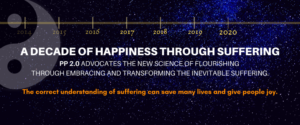
The new decade has started inauspiciously for the world and for myself.
Worse than the first decade that began with 9/11, the second decade has already been marked by megafires in Australia, rising threats of authoritarian ideologies and wars, humanitarian crises (see The New Humanitarian, 2020) existential angst over climate change, political unrest around the globe, and the rising tides of discrimination and hate crimes. The big picture for the new decade does not look bright from any angle. Both Buddhism and Christianity teach that the world is full of suffering. Only a die-hard Pollyanna could still see the world through a rose-coloured lens.
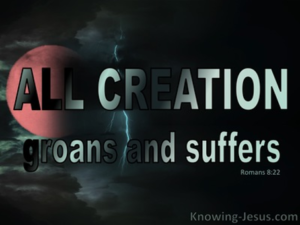 Personally, my new year did not begin in a promising way either. Healthwise, I am still struggling with the pain of my new denture, which deprives me of the simple pleasure of eating. My joint pains and hot flashes from hormone cancer treatment prevent me from a good night’s sleep. My psychological pain comes from grieving the death of Dr. Chan Wing Chow, an ophthalmologist and the best man at my wedding, as well as the death of my younger cousin, who was supposed to have visited me last year. Both died of massive strokes. I feel that my turn can happen any time.
Personally, my new year did not begin in a promising way either. Healthwise, I am still struggling with the pain of my new denture, which deprives me of the simple pleasure of eating. My joint pains and hot flashes from hormone cancer treatment prevent me from a good night’s sleep. My psychological pain comes from grieving the death of Dr. Chan Wing Chow, an ophthalmologist and the best man at my wedding, as well as the death of my younger cousin, who was supposed to have visited me last year. Both died of massive strokes. I feel that my turn can happen any time.
Workwise, I grieve the departure of my best research assistant, Evelyn, who went to Hong Kong to do Christian missionary work. How can I blame her for such a noble calling? Another unexpected bad news is that, right after the new year, my post-doc Lilian Jans-Beken opted out from the grant application for research on “Gratitude to God” on the grounds that she was an atheist.
I had guided her to develop the Existential Gratitude Scale (Jans-Beken & Wong, 2019), the first instrument for PP 2.0 (Wong, 2019a). I thought that she would be the logical choice to apply for an early career grant on gratitude to God as the next step. I was reluctant to apply for a major grant myself, because I was too old. Lilian’s refusal to incorporate my ideas on gratitude to God forced me to make history by being the oldest person to apply for a major research grant. However, my decision was met with an immediate setback—Trent University would not manage any research fund for me because I am no longer on campus.
Realistically, I have every reason to feel depressed because the world sucks (Reshe & Weintraub, 2020). Yet, strangely, all the negative experiences do not seem to bother me very much, because my primary concern was to do God’s work for his glory and his strength is made perfect in my weakness (2 Corinthians 12:9). Even with one leg already in the grave, I still have two hands and one mouth to help others. That is why I have nothing to lose when going through all the trouble of applying for a research grant, because my ideas about gratitude to God are based on my life-long research, and I believe that it would make an important contribution to the church and to psychology.
In short, everything seems to tell me that I am fighting a losing battle and that I should simply stop the futile struggle and start enjoying the life of a retiree like the rest of my colleagues. But I would rather die living for others than die enjoying my own life.
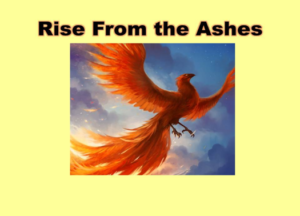 My swan song is both one of profound sorrow (Isaiah 53:5) and a triumphant one of hope. Like the biblical figure of Job, I can echo his bold declaration of faith: “Though he slay me, yet will I hope in him” (Job 13:15). Even in the depth of an abyss, I still believe that God can come to my rescue and use my last days for his glory. Unbelievers may claim that this is just wishful thinking or positive illusion, but God has never failed me, as attested by my successful career and productivity.
My swan song is both one of profound sorrow (Isaiah 53:5) and a triumphant one of hope. Like the biblical figure of Job, I can echo his bold declaration of faith: “Though he slay me, yet will I hope in him” (Job 13:15). Even in the depth of an abyss, I still believe that God can come to my rescue and use my last days for his glory. Unbelievers may claim that this is just wishful thinking or positive illusion, but God has never failed me, as attested by my successful career and productivity.
Consistent with the pattern of my entire life, I have never allowed adversities to defeat me. With God’s help, I have always managed to put negative experiences into good use. My favorite verse is Romans 8:28: “And we know that all things work together for good to those who love God, to those who are the called according to His purpose.” In his mysterious ways, beyond my comprehension, he is able to guide me and engineer circumstances to accomplish his purpose in me, as in the recent case of twists-and-turns in my grant application.
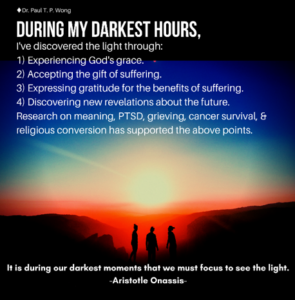 I have discovered time and time again the profound truth that the light is revealed to us only in our darkest hours. Expressing gratitude for the gift of suffering is only one of the magic transformers that can turn our painful emotions into thanksgiving and joy, as the Psalmists in the Bible have repeatedly taught us. This truth must be passed on to all suffering people.
I have discovered time and time again the profound truth that the light is revealed to us only in our darkest hours. Expressing gratitude for the gift of suffering is only one of the magic transformers that can turn our painful emotions into thanksgiving and joy, as the Psalmists in the Bible have repeatedly taught us. This truth must be passed on to all suffering people.
With years of research and life experiences behind me, I am now in the enviable, unique position to put everything together and make my last stretch of life’s journey the best and most productive period of my life. In short, out of the ashes of suffering and despair, the phoenix rises, stronger and brighter than ever. I do not know how, but I know how it works—no pain, no gain; no death, no rebirth.
In sum, there are no compelling reasons for me to retire. I will fight until I drop dead. I will fight against the evils of totalitarianism until my last breath. How can I retire, when the CCP is persecuting all religious believers in China, oppressing all freedom-loving people in Hong Kong, and repressing Tibetans and Uighurs in Xinjiang (Maizland, 2019)? How can I retire, when Beijing continues making threats to conquer my beloved Taiwan by force?
Yes, there is not much I can do against the power of the CCP. However, I can rally more people through whatever influence I can muster as a public figure to stand up against totalitarianism. I am going to start by faith: A Foundation of Hope for Freedom (FoHF) to serve two important functions. The first is to provide scholarships to young people from Hong Kong and Taiwan who have a proven record of fighting for freedom and democracy to study in North America; this will give them hope to develop their potentials and contribute to the democracy movement. When they are established in their careers, then they will put money back into the FoHF to support more young people to study abroad. The second purpose of the FoHF is that it will inspire more and more people to fight for democracy and freedom against oppression by the CCP. I pray that more people will support this initiative.
On the professional front, several encouraging things have happened. In this new year, already several clients have thanked me for changing their lives. I plan to teach more people about the Brief Meaning-Focused Therapy, which is an effective strategic action approach to help people afflicted with mental health issues with just one session (see Wong, 2019b). I am still doing the Toronto Meaningful Living Meetup to help people live more meaningful lives as a grassroots mental health movement (International Network on Personal Meaning, 2019). In addition, I have received many requests from around the world for meaning therapy training.
More importantly, I am also organizing the 11th Biennial International Meaning Conference in Toronto, which will take place in July of this year. At the last day of this conference, there will be the first Summit on positive mental health, designed to develop a holistic and economic program to effectively help the most people with the least cost. I pray and hope that we can turn the huge ship of the mental health industry away from the medical model towards a different direction (Wong, 2019c).
On the spiritual front, my pastor has asked me to give a devotion on their leadership retreat in February. I plan to speak on gratitude to God as a spiritual virtue, vital for victorious living. I plan to bring this message to other churches. I am also planning to package my knowledge on spirituality and psychology into a Christian book on the Sevenfold Path to Wholeness and Wellbeing with Dr. Dean Davey.
On the research front, there are also encouraging signs for me to move forward. First, my book review paper critiquing Positive Psychology (Wong, 2019f) has just been accepted for publication, after three rounds of peer review to sanitize my paper. I am also completing an invited lead article for The Journal of Positive Psychology on second wave positive psychology. More importantly, Dr. Robert Emmons has just informed me that I can apply for a grant for gratitude to God research through INPM rather than a university. I am grateful that this information opens the door for me to apply to different foundations for research funding.
As a result, I have designed a Happiness and Suffering Research Institute (HSRI) as the research arm of the charitable learned society I created more than 20 years ago, the International Network on Personal Meaning. I plan to raise money and bring together researchers to investigate the new science of transforming suffering in the service of individual happiness and global wellbeing. I do not know whether my grant application will be successful, but by faith I trust that God will provide the necessary funding for this important new science of happiness through overcoming suffering.

In light of the above, cultivating these six mindsets (BRAMMT) is essential for the resilient mind, according to PP 2.0. This is the ultimate test for success, especially in difficult and turbulent times:
- Believing mindset through faith in God, others, and the self.
- Responsible mindset through assuming personal and social responsibility.
- Appreciative mindset through existential gratitude.
- Mindful mindset through mindful meditation.
- Meaning mindset through focusing on what is right and good.
- Tough mindset through developing the true grit of courage and endurance.
I have frequently argued that just as physical health and wellbeing demand adequate control of disease and pain, so mental health and subjective wellbeing demand effective management of stress and suffering. Thirty years ago, I already argued that meaning and faith are the hidden dimension for mental and physical health (Wong, 1991). Now, I also want to investigate existential gratitude and gratitude to God as part of this hidden dimension. Unfortunately, so many leaders in positive psychology still have difficulty wrapping their heads around the idea that suffering is indispensable to both personal growth and happiness (Wong, 2019d).
The new science of PP 2.0 will demonstrate empirically that it is impossible to flourish without overcoming human limitations and suffering (Fowers, Richardson, & Slife, 2017; Wong, 2019a). In fact, all the available medical research on pain control (Bhattacharjee, 2019) and my lifelong research on coping with stress and suffering (see Google Scholar, n.d.) have supported my hypothesis that cultivating a resilient mind characterized by the above six mindsets is essential for overcoming suffering and achieving wellbeing.
To me, the first ten years of the 21st century is a decade of meaning (Wong, 2016a). My life story has proven that one can indeed live a vital, meaningful life, in spite of the limitations of old age and illnesses.
The second decade is a decade of happiness through transforming suffering. This is a greater and broader vision. It is no longer primarily concerned with individual efforts to live well and die well. It is more concerned with how we as a society can co-create a better future through research, education, and policies to develop a responsible democracy (Wong, 2019e), in which we all willingly share the collective burden and make the necessary personal sacrifices in order to create a more compassionate, just, and equal society in which all citizens have the opportunity to live a good life.
Growing support for my bold vision has come from two sources: First, the vision of mature happiness (Wong & Bowers, 2018) is more concerned with the need to discipline our minds in cultivating our virtues and inner life for the greater good (Dalai Lama, 2009; Levine, 2009; Wong, 2016b) than simply pursuing happiness-enhancing activities. Second, the pursuit of happiness without any consideration of the deeper issues of life actually can make you more miserable (Gruber, Mauss & Tamir, 2011; Lamothe, 2016; MacLellan, 2017; Whippman, 2016).
Thus, the new science can serve the dual purpose of reducing suffering and enhancing mature happiness simultaneously. Call this approach existential positive psychology (PP 2.0) or call it the science of happiness through suffering. Whatever you call it, the time has arrived for us to confront the reality of suffering and evils in our decade in order to develop a research program to promote global wellbeing through reducing suffering.
The FoHF and HSRI are my unfulfilled dreams; they will be my legacy in research and in the fight for democracy. I will die happy, working hard to implement this bold vision. I invite all my family, friends, and readers to support these two worthy initiatives.
I end here with my swan song for the next generation:
I came with a loud cry,
I’ve struggled to achieve my dreams,
Broken and bruised, but still striving.
When my time comes to join all my loved ones,
I’ll be ready to die with contentment and a smile.
That is the human life—so fragile and brief,
Let’s think of how to make the best of our time on earth before it’s too late.
Whatever choices you may face,
There is always another way.
Nature’s way is always the best—
be like water flowing through obstacles,
be like a cloud flying over the mountains.
There are always monsters in whatever disguise,
They will wave a sword and a bundle of cash,
“You must serve me or you die,” they loudly declare.
But there is always another way, a better way—
The way of love, truth, goodness will prevail,
If all freedom lovers stand up together against evil.
I have run the race and fought the good fight,
I would be happy to fade away quietly,
And become a nameless star shining in the dark,
Cheering for every brave soul in the cosmic battle.

References
- Bhattacharjee, Y. (2019, December 17). Scientists are unraveling the mysteries of pain. National Geographic. Retrieved from https://www.nationalgeographic.com/magazine/2020/01/scientists-are-unraveling-the-mysteries-of-pain-feature/
- Dalai Lama. (2009). The art of happiness: A handbook for living (10th anniversary ed.). New York, NY: Riverhead Books.
- Fowers, B. J., Richardson, F. C., & Slife, B. D. (2017). Frailty, suffering, and vice: Flourishing in the face of human limitations. Washington, DC: American Psychological Association.
- Google Scholar. (n.d.). Paul T. P. Wong. Retrieved from https://scholar.google.ca/citations?user=eBAq-D0AAAAJ&hl=en
- Gruber, J., Mauss, I. B., & Tamir, M. (2011). A dark side of happiness? How, when, and why happiness is not always good. Perspectives on Psychological Science, 6(3), 222-233. https://doi.org/10.1177/1745691611406927
- International Network on Personal Meaning. (2019, May 2). Giving positive psychology away as a grassroots movement to combat the mental health crisis of depression and suicide. EinNews. Retrieved from https://www.einnews.com/pr_news/484071351/giving-positive-psychology-away-as-a-grassroots-movement-to-combat-the-mental-health-crisis-of-depression-and-suicide
- Jans-Beken, L., & Wong, P. T. P. (2019). Development and preliminary validation of the Existential Gratitude Scale (EGS). Counselling Psychology Quarterly, 32(3-4), 275-284. https://doi.org/1080/09515070.2019.1656054
- Lamothe, C. (2016, November 24). People are making themselves miserable by trying too hard to be happy. Retrieved from https://qz.com/844099/people-are-making-themselves-miserable-by-trying-too-hard-to-be-happy/
- Levine, M. (2009). The positive psychology of Buddhism and Yoga (2nd ed.). New York, NY: Routledge.
- MacLellan, L. (2017, July 23). Accepting your darkest emotions is the key to psychological health. Retrieved from https://qz.com/1034450/accepting-your-darkest-emotions-is-the-key-to-psychological-health/
- Maizland, L. (2019, November 25). China’s repression of Uighurs in Xinjiang. Council on Foreign Relations. Retrieved from https://www.cfr.org/backgrounder/chinas-repression-uighurs-xinjiang
- Reshe, J., & Weintraub, P. (Ed.). (2020, January 9). Depressive realism. Aeon. Retrieved from https://aeon.co/essays/the-voice-of-sadness-is-censored-as-sick-what-if-its-sane?fbclid=IwAR2-7XhPXPkdeJDRi07HQm-aY8vUQOBer9H3eF_oNtXnwSYONccwFb34QMI
- The New Humanitarian. (2020, January 1). Ten humanitarian Crises and trends to watch in 2020. Retrieved from https://www.thenewhumanitarian.org/feature/2020/1/1/humanitarian-crisis-to-watch?gclid=CjwKCAiA6vXwBRBKEiwAYE7iS43_4-LDhjq1po45KpP-G5Z6LARrZx4Sx25CI3umU5CLq24xzv_anRoCcWcQAvD_BwE
- Whippman, R. (2016). America the anxious: How to calm down, stop worrying, and find happiness. New York, NY: St. Martin’s Press.
- Wong, P. T. P., & Bowers, V. (2018). Mature happiness and global wellbeing in difficult times. In N. R. Silton (Ed.), Scientific concepts behind happiness, kindness, and empathy in contemporary society (pp. 112-134). Hershey, PA: IGI Global.
- Wong, P. T. P. (1991). Existential versus causal attributions: The social perceiver as philosopher. In S. L. Zelen (Ed.), New models, new extensions of attribution theory (pp. 84-125). New York, NY: Springer-Verlag.
- Wong, P. T. P. (2016a). A decade of meaning: Past, present, and future. Journal of Constructivist Psychology, 30(1), 82-89. https://doi.org/10.1080/10720537.2015.1119085
- Wong, P. T. P. (2016b). Self-transcendence: A paradoxical way to become your best. International Journal of Existential Psychology and Psychotherapy, 6(1). https://doi.org/10.1177/1745691611406927
- Wong, P. T. P. (2019a). Second wave positive psychology’s (PP 2.0) contribution to counselling psychology [Special issue]. Counselling Psychology Quarterly. Retrieved from https://doi.org/10.1080/09515070.2019.1671320
- Wong, P. T. P. (2019b, December 19). A clinical case based on Meaning Therapy and PP 2.0. Paul T. P. Wong. Retrieved from http://www.drpaulwong.com/a-clinical-case-based-on-meaning-therapy-and-pp-2-0/
- Wong, P. T. P. (2019c, July 16). The current mental health crisis and meaning therapy. Presented at Ottawa’s Royal Mental Health Center, Canada. Retrieved from https://www.meaning.ca/article/the-current-mental-health-crisis-and-meaning-therapy/
- Wong, P. T. P. (2019d, November 21). Why and how i developed the positive psychology of suffering. Paul T. P. Wong. Retrieved from http://www.drpaulwong.com/why-and-how-i-developed-the-positive-psychology-of-suffering/
- Wong, P. T. P. (2019e, October 10). What is the greatest need today? Responsibility is the key to surviving and thriving in dangerous times. Positive Living Newsletter. Retrieved from http://www.drpaulwong.com/what-is-the-greatest-need-today-responsibility-is-the-key-to-surviving-and-thriving-in-dangerous-times/
- Wong, P. T. P. (2019f). The maturing of positive psychology and the emerging PP 2.0 [Review of the book Positive Psychology (3rd ed.), by W. Compton & E. Hoffman]. Paul T. P. Wong. Retrieved from http://www.drpaulwong.com/the-maturing-of-positive-psychology-and-the-emerging-pp20-a-book-review-of-positive-psychology-3rd-ed-by-william-compton-and-edward-hoffman/
Cite
Wong, P. T. P. (2019, January 24). Coda: My Swan Song. Dr. Paul T. P. Wong. Retrieved from http://www.drpaulwong.com/coda-my-swan-song/

 Meaning Conference 2025 will be the INPM’s first in-person conference with a virtual option after the pandemic.
Meaning Conference 2025 will be the INPM’s first in-person conference with a virtual option after the pandemic.